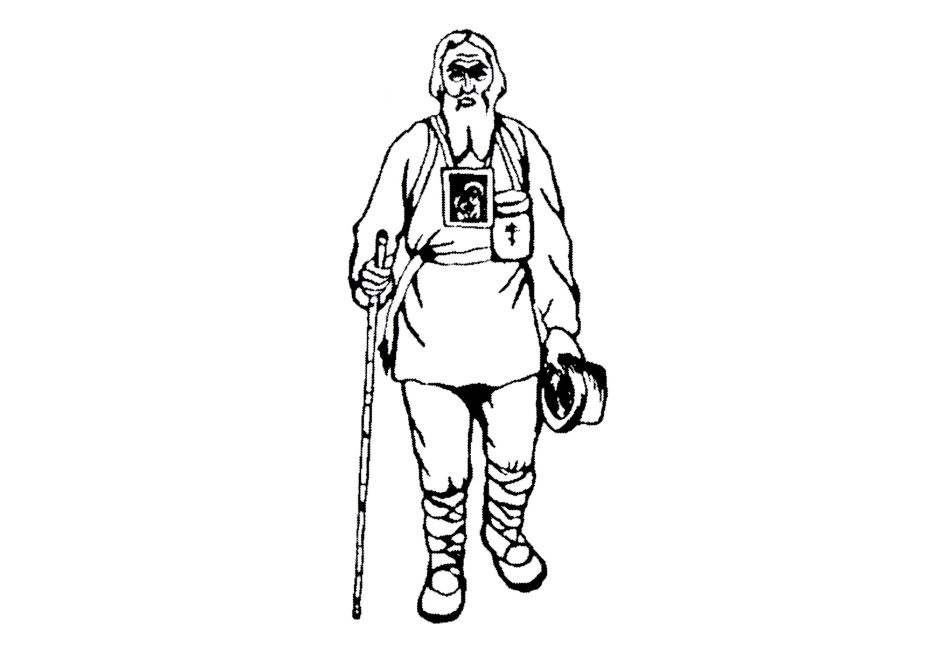
Pilgrims are weary and tired, are often without shelter, and in some places are reviled and despised…
In Russia, pilgrimage is a deep and profound tradition dating back to the origins of Christianity there. It contains, for the Russian, many facets of the spiritual life. Primarily, it is pilgrimage towards God. It is the pilgrimage of a soul on fire, hungry for the sight of the Lord’s face. It is the incarnation in one’s own person of Psalm 41:
Like the deer that yearns
for running streams,
so my soul is yearning
for you, my God.
My soul is thirsting for God,
the God of my life;
when can I enter and see
the face of God?
My tears have become my bread,
by night, by day,
as I hear it said all the day long:
“Where is your God?”
It is a pilgrimage into kenosis, an emptying, for the pilgrim takes, literally, no luggage and practically no money. Pilgrimage and begging are symbols of Christ’s humility. They are symbols of one’s poverty and total trust in God’s Divine Providence. The pilgrim is an incarnation of the poor man of Yahweh, the poor man of the beatitudes, the anawim.
The pilgrim is in search of wealth, for he seeks the pearl of great price that the Lord spoke about. He seeks it within his soul, within his heart, as he walks through forest, fields, mountains, dales.
His life’s values change; he is reaching out for sanctity. He is becoming the pearl of great price. He will have found it when he is truly able to say, “I live, not I, Christ lives in me.”
The Russian pilgrim dreams, above all, of going to the Holy Land, but other shrines are important too. He feels, understands, and becomes one with the saint of each shrine, or with Our Lady if it be her shrine. This is precious to the Russian pilgrim for it enhances his already developed sense of the communion of saints.
◈◈◈
Pilgrimage is prayer and penance combined. At the same time, it is the joyful realization that man slowly becomes the image of the Christ “who had nowhere to lay his head,” the Christ of the Passion.
It is the Russian Way of the Cross, not made in a church but felt in every muscle and sinew, in the mind, heart, and soul of the person. For pilgrims are weary and tired, are often without shelter, and in some places are reviled and despised.
As he moves through the countryside or city, the pilgrim may suddenly feel an intensification of prayer, as if the Lord wanted him, or was even begging him, to stop in this particular place to pray over it. Even pilgrims going to the Holy Land would linger because of this inner intuition and stay in a given place as long as the feeling lasted.
For this reason, pilgrimages were usually unplanned. No Russian would understand the “rush pilgrimage” of the West, taken via the airways or trains. Though a ship might be necessary to cross the sea, by and large a pilgrimage should be made on foot.
Time, therefore, is not of the essence. To the Russian, pilgrimage is to enter into timelessness, into eternity.
There is a tremendous liberation in a pilgrimage of this sort. One is free to stop and rest, to walk more than one expected or less than one expected. There is an openness to the Spirit that beggars words. There is a freedom, an inner freedom, the freedom of the children of God.
All along the way one is occupied with the interior prayer, the “Jesus Prayer.” At the same time, one is deeply aware that during a pilgrimage like this, one must incarnate without compromise the Gospel of the Lord, his Law of Love.
As mentioned above, Russian pilgrims had no money and were beggars for food and shelter. They could not give financial assistance to anyone, but they could give of themselves in an infinite variety of ways.
Above all, they could, with deep love, respect, and grave humility, accept anyone and everyone who crossed their path. For this was the time to learn in depth what Christ meant when he said, Learn of me for I am meek and humble. This was the time to live the beatitudes.
Yes, pilgrimage is truly a deep and profound tradition. It is the search for the holy, for God. The search which never ceases.
Excerpted from Restoration April, 1971
Image: “Pilgrim” drawing by ©Carolyn Desch, Madonna House




